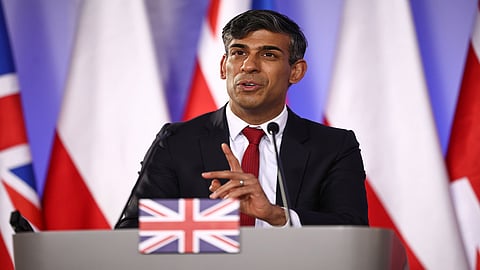

London | British Prime Minister Rishi Sunak on Sunday refused to categorically rule out a July general election amid a damaging defection by one of his Conservative Party MPs to the Opposition Labour Party, just days before local and mayoral elections in the country on May 2.
Dan Poulter, a doctor and Central Suffolk and North Ipswich member of Parliament said he will switch his allegiance to the Opposition benches before standing down as a parliamentarian at the next election because he can no longer defend the Tory government’s track record on the National Health Service (NHS).
Against the backdrop of this latest embarrassment, Sunak was asked during a ‘Sky News’ interview that his repeated assertion of a general election in the "second half of this year" could also mean July.
"When it comes to a general election, I've been very clear about that multiple times, and again, I'm not going to say anything more than I've already said, I've been very clear about that," said Sunak, who was then pressed five times to rule out an election during what would be a peak summer month for the UK.
"You're going to try and draw whatever conclusion you want from what I say. I'm going to always try and say the same thing. You should just listen to what I said, [the] same thing I've said all year,” he replied.
On the state-funded NHS, Sunak pointed to a drop in the waiting times for patients seeking treatment and pointed to some of his other successes as Prime Minister, such as bringing down inflation, hiking the defence budget and getting the Safety of Rwanda Bill passed through Parliament to start deporting illegal migrants to the east African country from later this year.
"And when the election comes, there'll be a clear choice because the Labour Party has tried to frustrate our Rwanda bill because they don't believe in stopping the boats; their economic plan will put people's taxes up. They haven't said that they will invest more in our defence, and they certainly don’t agree with reforming our welfare system to support people into work," said Sunak.
He, however, admitted that “local elections are always difficult for incumbent parties” as the voting patterns on Thursday are widely seen as a precursor to what can be expected from a general election – which legally must take place by January 2025 at the latest.
Meanwhile, some UK media reports suggest that keeping the threat of a summer election on the table – earlier than the expected October/November timeline – is being used as a tactic by Downing Street to deter any internal party rebellion against Sunak’s leadership in the wake of potentially disastrous local poll results later this week.
With the governing Tories being forecast for a general election wipe-out by most opinion polls, an early election would not be the preferred timing for most sitting Conservative MPs hoping to save their seats.
